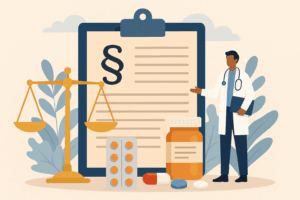⚖️ Benzodiazepines and Zolpidem in India: Legal Status, OTC Misuse, and Safe Prescription Practices
 🧠 Why This Matters
🧠 Why This Matters
Medications like Alprazolam, Clonazepam, Diazepam, and Zolpidem are commonly prescribed for anxiety, insomnia, and acute distress. While effective, these medications also carry significant risks of dependence, overuse, and diversion—especially in India, where over-the-counter (OTC) misuse is still widespread.
As a practicing psychiatrist, I’ve seen both the benefits and the harms. Here’s what you need to know—and how I approach safe, responsible prescribing.
📜 Indian Laws Governing Benzodiazepines and Z-Drugs
1. Schedule H & H1 Drugs – Prescription Only
Under the Drugs and Cosmetics Act (1940) and Rules (1945):
-
Schedule H: Most benzodiazepines and zolpidem are listed here
→ Requires valid prescription -
Schedule H1 (since 2014): High-risk psychotropics now face stricter control
→ Examples: Alprazolam, Zolpidem, Clonazepam, Nitrazepam
Pharmacists must:
-
Retain prescription copies for 3 years
-
Maintain a sale register
-
Display a red box warning on the label
-
Submit monthly reports to regulators
🚫 Dispensing without a prescription is illegal—and dangerous.
2. NDPS Act (1985) – Criminal Penalties for Misuse
Under the Narcotic Drugs and Psychotropic Substances (NDPS) Act:
-
Several benzodiazepines (and Zolpidem) are classified as psychotropic substances
-
Unlicensed sale, possession, or use is punishable by law
🔒 Penalties range from fines to imprisonment, especially in cases of repeat or commercial misuse.
3. ⚠️ The Reality: OTC Sales and Poor Enforcement
Despite these laws, real-world compliance is inconsistent:
-
Many pharmacies still sell sleeping pills without a valid prescription
-
Lack of pharmacist awareness or oversight
-
Growing online sales with inadequate checks
This creates a silent public health crisis:
-
Teenagers and adults self-medicating for stress and sleep
-
Prolonged use leading to dependence
-
Increased risk of falls, cognitive issues, and overdose
✅ My Approach: Safe Prescription and Early Deprescribing
As a psychiatrist, I follow a safe, evidence-based model that protects both patients and public health:
✔ When I Do Prescribe
-
Clear indications only (acute anxiety, short-term insomnia)
-
Minimal effective dose
-
Time-limited course (typically 2–4 weeks max)
-
No repeats without review
✔ What I Offer Instead (or Alongside)
-
CBT-I (Cognitive Behavioural Therapy for Insomnia)
-
Sleep hygiene coaching
-
Melatonin for circadian rhythm issues
-
Supportive psychotherapy and stress management
✔ Tapering and Discontinuation
-
If a patient is already dependent on benzodiazepines or zolpidem:
-
I create a personalized taper plan
-
Monitor for withdrawal and rebound
-
Gradually introduce non-drug strategies
-
💡 Summary: Legal Doesn’t Mean Harmless
Just because a drug is available, doesn’t mean it’s safe for long-term use.
India’s legal framework (Schedule H1, NDPS Act) is robust on paper, but enforcement gaps allow for widespread misuse. Responsible prescribing starts with awareness, ethics, and patient education.
👨⚕️ About Dr. Srinivas Rajkumar T
Dr. Srinivas Rajkumar T, MD (AIIMS, New Delhi), DNB, MBA (BITS Pilani)
Consultant Psychiatrist – Chennai
I specialize in:
-
Sleep disorders & insomnia treatment
-
Deprescribing of benzodiazepines and zolpidem
-
Anxiety management using psychological and pharmacological methods
-
CBT-based sleep recovery without long-term pill use
📍 Clinics:
-
Apollo Clinic, Velachery (Opp. Phoenix Marketcity)
-
Kumar’s Healthcare, Chromepet (Near Tambaram, Pallavaram)
📞 Appointments: 8595155808
“Sleep can heal—but it shouldn’t come with lifelong dependency. Let’s work together to find safer, sustainable solutions.”